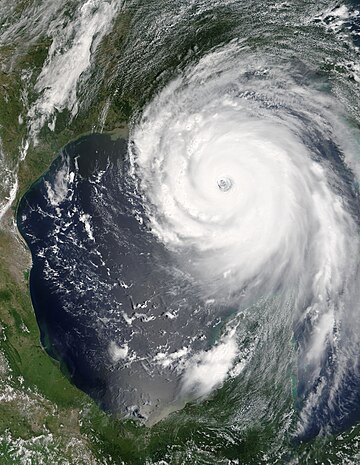Hurricane Katrina
Hurricane Katrina was one of the deadliest hurricanes to ever hit the United States and the second Category 5 hurricane of the record-breaking 2005 Atlantic hurricane season.
| Category 5 major hurricane (SSHWS/NWS) | |
 Hurricane Katrina at peak intensity in the Gulf of Mexico on August 28, 2005 | |
| Formed | August 24, 2005 |
|---|---|
| Dissipated | August 31, 2005[1] |
| (Extratropical after August 29) | |
| Highest winds | 1-minute sustained: 175 mph (280 km/h) |
| Lowest pressure | 902 mbar (hPa); 26.64 inHg |
| Fatalities | 1,933 total |
| Damage | 125 billion (2005 USD) (Tied as costliest tropical cyclone on record[2]) |
| Areas affected |
|
| Part of the 2005 Atlantic hurricane season | |
Storm history
The storm formed over the Bahamas on August 23, where it moved west and hit south Florida as a Category 1 hurricane two days later. Katrina then crossed over Florida and strengthened into a Category 5 hurricane moving west in the Gulf of Mexico.
The storm then turned north, had an eyewall replacement cycle, and hit east Louisiana and Mississippi, flooding coastal areas on the morning of August 29.
The leftovers of Katrina then died out over the Great Lakes on August 31.
Impact
80% of New Orleans was flooded when the levees protecting the city broke.[3][4] Most of the people killed by Katrina were thought to have died from drowning. Many of the survivors had swum to higher roofs or tree branches.
Hurricane Katrina Media
Flanked by Michael Chertoff, Secretary of Homeland Security, left, and Secretary of Defense Donald Rumsfeld, President Bush meets with members of the Task Force on Hurricane Katrina Recovery on August 31, 2005.
In Katrina's Wake – short film by NASA
Damage to a mobile home in Davie, Florida following Hurricane Katrina
Flooding in Venice, Louisiana
A fallen water tower in Buras-Triumph, Louisiana, where Katrina made landfall
Hurricane Katrina making landfall in New Orleans, Louisiana.
Flooded I-10/I-610/West End Blvd interchange and surrounding area of northwest New Orleans and Metairie, Louisiana
Related pages
References
- ↑ Knabb, Richard D (December 20, 2005) [[[:Template:NHC TCR url]] Hurricane Katrina: August 23 – 30, 2005] , United States National Oceanic and Atmospheric Administration's National Weather Service. Report. Retrieved on January 8, 2016.
- ↑ https://www.nhc.noaa.gov/news/UpdatedCostliest.pdf
- ↑ "Hurricane Katrina". Archived from the original on 2012-07-31. Retrieved 2010-11-23.
- ↑ Swenson, Dan D.; Marshall, Bob (May 14, 2005). "Flash Flood: Hurricane Katrina's Inundation of New Orleans, August 29, 2005". Times-Picayune. Archived from the original (SWF) on October 17, 2012. Retrieved June 7, 2007.
Other websites
| Definitions from Wiktionary | |
| Media from Commons | |
| News stories from Wikinews | |
| Quotations from Wikiquote | |
| Source texts from Wikisource | |
| Textbooks from Wikibooks | |
| Learning resources from Wikiversity | |
- National Hurricane Center's Tropical Cyclone Report on Hurricane Katrina
- National Hurricane Center's archive on Hurricane Katrina
- Hurricane Katrina Rainfall Information from HPC Archived 2015-04-24 at the Wayback Machine
- Hydro-meteorological Prediction Center's "archive on Hurricane Katrina". Archived from the original on 2008-06-13.
- NASA's Hurricane Katrina Archive Archived 2007-09-04 at the Wayback Machine
- Geology and Hurricane-Protection Strategies in the Greater New Orleans Area Archived 2010-06-28 at the Wayback Machine Louisiana Geological Survey publication on Hurricane Katrina